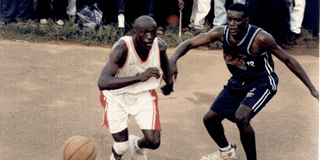Why Falcons relegation is not bad for basketball

Man marking. Sadolin Powers’ Isaac Afidra (R) guards Falcons Stephen Omony 16 years ago at YMCA Courts, Wandegeya when Falcons was the hottest property on the National Basketball League scene and easily one of the best in the region. FILE PHOTO
From Silverbacks participating at Afrobasketball to City Oilers taking part at the Africa basketball club championships and the Gazelles similarly locking horns with the continent’s best, it’s been a surreal period for the sport.
The gains of 2015, 16 and 17 have elevated the game to a new level where Uganda has grown to command near-household status inside the corridors of Fiba, not so much for competition like participation.
It is why the demise of Falcons as a topflight entity was almost an afterthought until it actually happened.
In truth Falcons’ dying process was a protracted one whose end will cause a moment for reflection.
Falcons, however, were relegated because they are part and parcel of the cyclic nature of sport.
So many reasons have been fronted, from the death of founder John Ssimbwa, to a lack of sustained funding from the club’s recent management and so forth.
Maybe. But the cyclical pattern of sport is that a flagging club will experience challenges well beyond human control to make the centre crumble.
Relative newcomers
Falcons’ relegation in the end may not be bad for the game after all. And here is why.
Basketball today is being steered by clubs like City Oilers, Pemba Warriors and Betway Power.
Of the three, champions Oilers are the relative newcomers on the scene having gained promotion to the main division in 2013.
To Oilers, Warriors and Power, you can add UCU Canons, KIU Titans and Ndejje. But there was a time when Falcons was the best supported and best facilitated club in the country. Then, they were the envy of all clubs in the country.
When the club’s fortunes nosedived, so did their sea of ardent fans. By the time Falcons became a spent force, their games were watched by a paltry number with the hegemony of old gone.
In the glorious era of the Malinga brothers, you couldn’t touch the red of Falcons.
It is now apparent that the club was built on the jelly foundation of individuality and remained so for a prolonged period.
This is not a snide remark to the legacy of Ssimbwa whose contribution to Ugandan basketball deserves to be etched in stone.
It is a statement that is applicable to most of the good stories of Ugandan sport and society as a whole.
Rarely is institutionalism promoted and championed.
In fact our DNA as a people is to leave a few individuals do a lot of work.
And that is because most of the times the so many people tasked to execute any mission tend to end up doing so little.
We have not, as a society, found the middle ground of building institutions around the concrete base of efficient numbers.
What befell Falcons is not catastrophic. Relegation in sport is not an abnormal occurrence.
Payback time
The true Falcons fans who enjoyed the club’s dizzy heights of old have the wherewithal to put the house in order and make them earn promotion back into the topflight at the first time of asking.
But for that to happen, it will test the organisational capability of Dennis Mbidde and other prominent Falcons fans.
Falcons’ story is a reminder of the unpredictability of sport. Once upon a time Blue Jackets were the Oilers of the time. You could say the same for Rhinos.
Institutions that pass the test of time are built on organisation cores.
Short of that, the cyclic syndrome will claim a victim. That is the true story of sport and therein lies the Falcons lesson for the rest of the league.
[email protected]
@mnamanya




